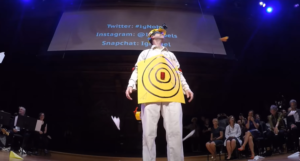
Opera Profile: The Incompentence Opera
By John Vandevert“The Incompetence Opera” was a short, three-act mini-opera performed as part of the 27th Annual Ig Nobel Prize ceremony in 2017, an annual parody event founded by freelance writer and Harvard University graduate Marc Abrahams in 1991 as a farcical homage to the Nobel Peace Prize award. The event honors unnecessary research into themes that are obviously insipid in character.
The event is held annually at Harvard University, the opera being performed at the Sanders Theatre to an obviously full crowd, as one can see. According to the event’s history, ever since 1996, there has been featured a mini-opera that features singers and non-singers alike engaged in a comical, droll display of operatic theatre. Inspired by the Bugs Bunny cartoons, where operatic productions are parodied, each opera uses both classical and popular songs to tell a wholly irrelevant story about ludicrous material. The opera is a composite of original and quotation musical selections, albeit with a unique story and libretto, with music coming from the Italian composer Giacomo Puccini (“Turandot,” 1924), American Tin-Pan alley composer John W. Bratton (songs including “Teddy Bears’ Picnic”, 1932), and an anonymous contributor. The opera’s words and story were created by Abrahams, whose ideas were developed and inspired by the “Peter principle” (a person in a workplace hierarchy will rise in their placements until their previous skills no longer match their current circumstances), and the “Dunning-Kruger effect” (those will low cognitive knowledge and skill in certain areas feel more inclined to critique and provide their views on subjects for which they have no little expertise. Further, those will low proficiency tend to overestimate their abilities, while those with higher levels tend to undervalue their abilities).
The opera’s narrative is about an interaction between a bartender and a psychologist and their conversation about feeling unsatisfied with their current life paths. As the opera unfolds, the psychologist grows in their angst and begins to expound on his knowledge in an effort to comfort himself, and by the end, he ends up talking about a paper about the “Dunning-Kruger effect.” The production was directed by soprano Maria Ferrante and Dr. Robin Abrahams, speaker and author (as well as wife to Marc Abrahams), and featured the tenor Ray Bauwens, a chorus of volunteer singers, and a three-person orchestral accompaniment by Uzbekistanian-born pianist Yulia Yun, Dr. Thomas Michel, and Dr. Bruce Andrew Koplan. The year 2022 saw the release of another three-act mini-opera, “The Know-It-All Club,” written by Abraham in conjunction with many similar people.
Watch the “opera”
Categories
Opera Wiki

